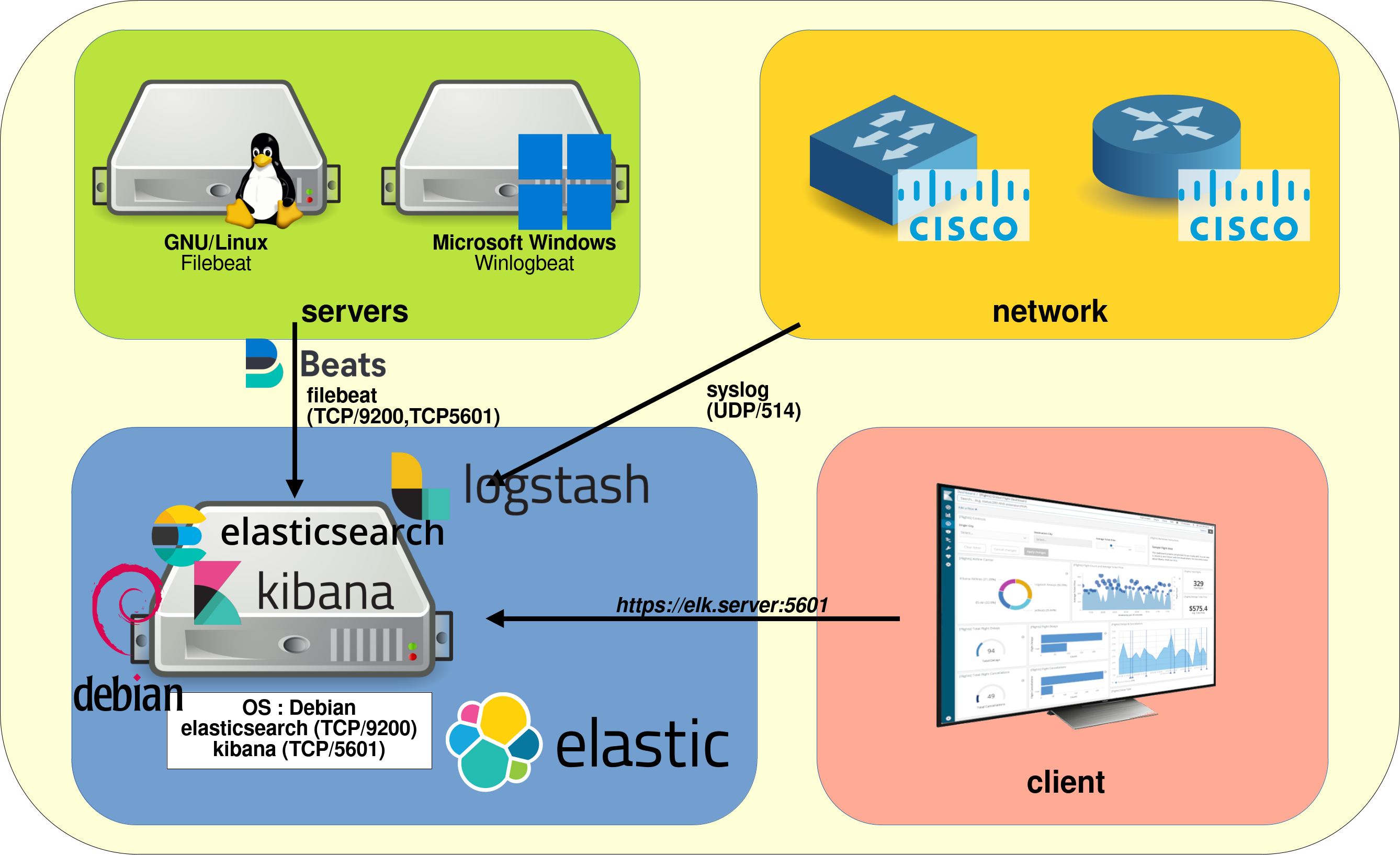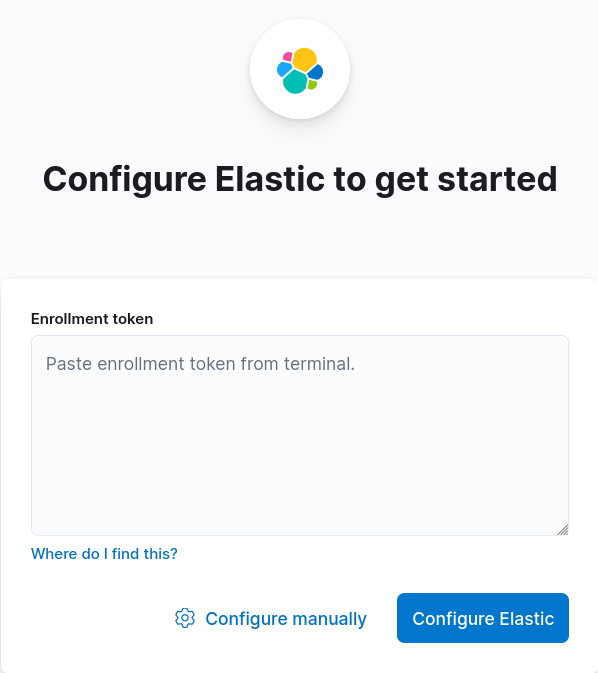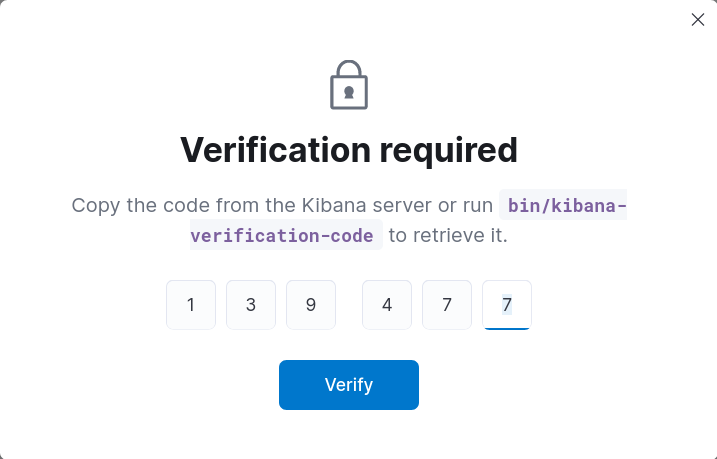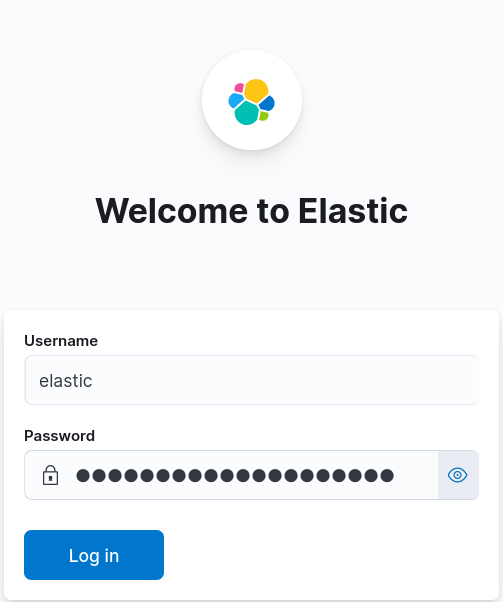Déployer Elastic 9 (Elasticsearch + Kibana) sur Debian pour la centralisation des journaux
- Mise à jour le 28 avril 2025
Dans cet article, je vais vous montrer comment installer Elastic, une solution de SIEM (Security Information and Event Management) développée par Elastic NV. Un SIEM est une plateforme de cybersécurité qui centralise et analyse les journaux et événements provenant de multiples appareils d'un réseau, permettant ainsi la détection d'activités anormales et la génération d'alertes en temps réel.
Nous allons installer la solution complète Elastic, qui comprend Elasticsearch et Kibana, sur un serveur Debian déployé en local (on-premises) — ce qui signifie qu'aucune licence payante n'est requise pour une utilisation de base. Cependant, je recommande toujours aux entreprises de souscrire à une licence commerciale afin de bénéficier d'un support complet et de fonctionnalités supplémentaires. J'avais précédemment publié un article concernant l'installation de Elastic Stack version 8 (disponible ici), et avec la sortie de la version 9, je saisis cette opportunité pour mettre à jour ce guide.
Architecture Elastic
Elasticsearch est un moteur de stockage, de recherche et d'analyse distribué et en temps réel.
Kibana est une plateforme d'analyse et de visualisation open source conçue pour fonctionner avec Elasticsearch. Kibana sera utilisé pour rechercher, visualiser et interagir avec les données stockées dans les index Elasticsearch.

Notes
Versions
- OS : Debian
- Elasticsearch : 9
Liens
- Lien de téléchargement : https://www.elastic.co/
- Guide officiel : https://www.elastic.co/docs/deploy-manage/deploy/self-managed/install-elasticsearch-with-debian-package
- Éditions Elastic : https://www.elastic.co/subscriptions
Les composants d'Elastic
Principaux
- Elasticsearch : Moteur distribué, RESTful, de recherche et d'analyse.
- Kibana : Visualisez vos données. Naviguez dans Elastic.
- Beats : Collecte, analyse légère et expédition des données.
Autres
- Logstash : Ingestion, transformation, enrichissement et exportation des données.
- Filebeat : Analyse en temps réel des journaux.
Ports utilisés
- Port par défaut d'Elasticsearch :
http://IP_ADDRESS:9200 - Accès web de Kibana :
http://IP_ADDRESS:5601 - Port par défaut de Logstash :
9600
Installation d'Elastic (Serveur Debian)
Prérequis
- Installer
apt-transport-httpsainsi que les paquets nécessaires :
root@host:~# apt update && apt install apt-transport-https gnupg curl wget- Importer la clé PGP d'Elasticsearch :
root@host:~# wget -qO - https://artifacts.elastic.co/GPG-KEY-elasticsearch | gpg --dearmor -o /usr/share/keyrings/elasticsearch-keyring.gpg- Ajouter la définition du dépôt :
root@host:~# echo "deb [signed-by=/usr/share/keyrings/elasticsearch-keyring.gpg] https://artifacts.elastic.co/packages/9.x/apt stable main" | tee /etc/apt/sources.list.d/elastic-9.x.listElasticsearch
- Installer Elasticsearch et noter le mot de passe du superutilisateur :
root@host:~# apt update && apt install elasticsearch[…]
--------------------------- Security autoconfiguration information ------------------------------
Authentication and authorization are enabled.
TLS for the transport and HTTP layers is enabled and configured.
The generated password for the elastic built-in superuser is : elastic_password;)
If this node should join an existing cluster, you can reconfigure this with
'/usr/share/elasticsearch/bin/elasticsearch-reconfigure-node --enrollment-token <token-here>
after creating an enrollment token on your existing cluster.
You can complete the following actions at any time:
Reset the password of the elastic built-in superuser with
'/usr/share/elasticsearch/bin/elasticsearch-reset-password -u elastic'.
Generate an enrollment token for Kibana instances with
'/usr/share/elasticsearch/bin/elasticsearch-create-enrollment-token -s kibana'.
Generate an enrollment token for Elasticsearch nodes with
'/usr/share/elasticsearch/bin/elasticsearch-create-enrollment-token -s node'.
-------------------------------------------------------------------------------------------------
Kibana
- Install Kibana:
root@host:~# apt update && apt install kibanaConfiguration
Elasticsearch
- Modifier le fichier
/etc/elasticsearch/elasticsearch.ymlpour définir l'adresse de liaison sur toutes les interfaces :
network.host: 0.0.0.0- Démarrer le service elasticsearch :
root@host:~# systemctl start elasticsearch.service- Vérifier que le service elasticsearch est en cours d'exécution :
root@host:~# curl --cacert /etc/elasticsearch/certs/http_ca.crt -u elastic https://localhost:9200
Enter host password for user 'elastic': elastic_password;)
{
"name" : "std",
"cluster_name" : "elasticsearch",
"cluster_uuid" : "StdgreaTBanDKphU4S0ceg",
"version" : {
"number" : "9.0.0",
"build_flavor" : "default",
"build_type" : "deb",
"build_hash" : "112859b85d50de2a7e63f73c8fc70b99eea24291",
"build_date" : "2025-04-08T15:13:46.049795831Z",
"build_snapshot" : false,
"lucene_version" : "10.1.0",
"minimum_wire_compatibility_version" : "8.18.0",
"minimum_index_compatibility_version" : "8.0.0"
},
"tagline" : "You Know, for Search"
}Kibana
- Modifier le fichier
/etc/kibana/kibana.ymlpour définir l'adresse de liaison sur toutes les interfaces :
server.host: "0.0.0.0"
server.publicBaseUrl: "http://X.X.X.X:5601"- Démarrer le service :
root@host:~# systemctl start kibana.service- Créer un jeton d'enrôlement :
root@host:~# /usr/share/elasticsearch/bin/elasticsearch-create-enrollment-token -s kibana
eyJ2ZXIiOiI4LjEuMiIsImFkciI6WyIxOTIuMTY4LjEuNjY6OTIwMCJdLCJmZ3IiOiJmYzdiZmFmMjNmODEzN2M1NmY4YTg1NGMxNTdjMWFkYTNiZDdiOGM4NTE4YTZhNmI3wWNiYzBkNzc0ZTRjNzc1Iiwia2V5Ijoib1ZBTkVJQUIxWVNBT0BiUWVsUVc6cEU1WXF3U1FTUENjcFFaZUJvTGtKdyJ0- Depuis Firefox, ouvrez
http://X.X.X.X:5601, collez le jeton d'enrôlement puis cliquez sur Configurer Elastic :

- Générez un code de vérification pour Kibana et collez-le :
root@host:~# /usr/share/kibana/bin/kibana-verification-code
Your verification code is: 139 477
- Nous pouvons désormais nous connecter à Kibana avec le compte elastic :

Sécuriser Kibana
Depuis la version 8, Elasticsearch est automatiquement configuré pour chiffrer ses communications.
Ce n'est pas le cas pour Kibana, avec lequel nous nous connectons en utilisant HTTP. Nous allons voir comment activer les connexions en HTTPS.
- Exécutez le script
kibana-encryption-keyset copiez les valeurs générées sous les paramètres correspondants :
root@host:~# /usr/share/kibana/bin/kibana-encryption-keys generate
## Kibana Encryption Key Generation Utility
The 'generate' command guides you through the process of setting encryption keys for:
xpack.encryptedSavedObjects.encryptionKey
Used to encrypt stored objects such as dashboards and visualizations
https://www.elastic.co/guide/en/kibana/current/xpack-security-secure-saved-objects.html#xpack-security-secure-saved-objects
xpack.reporting.encryptionKey
Used to encrypt saved reports
https://www.elastic.co/guide/en/kibana/current/reporting-settings-kb.html#general-reporting-settings
xpack.security.encryptionKey
Used to encrypt session information
https://www.elastic.co/guide/en/kibana/current/security-settings-kb.html#security-session-and-cookie-settings
Already defined settings are ignored and can be regenerated using the --force flag. Check the documentation links for instructions on how to rotate encryption keys.
Definitions should be set in the kibana.yml used configure Kibana.
Settings:
xpack.encryptedSavedObjects.encryptionKey: caeb7879368e3dd66d7302f6810daec1
xpack.reporting.encryptionKey: c1c89f500966ac710f7fa5eaf2939976
xpack.security.encryptionKey: e1458d710ffb321e4a4f4eb792c78b2b- Insérez les informations copiées précédemment dans le fichier
/etc/kibana/kibana.yml:
[…]
xpack.encryptedSavedObjects.encryptionKey: caeb7879368e3dd66d7302f6810daec1
xpack.reporting.encryptionKey: c1c89f500966ac710f7fa5eaf2939976
xpack.security.encryptionKey: e1458d710ffb321e4a4f4eb792c78b2b- Récupérez le mot de passe sécurisé du conteneur
http.p12:
root@host:~# /usr/share/elasticsearch/bin/elasticsearch-keystore show xpack.security.http.ssl.keystore.secure_password
592l_UJGSXmliJIvuokDab- Extrayez les certificats nécessaires vers
/etc/kibana/:
root@host:~# cd /etc/kibana/root@host:~# openssl pkcs12 -in /etc/elasticsearch/certs/http.p12 -out server.crt -clcerts -nokeys
Enter Import Password:592l_UJGSXmliJIvuokDabroot@host:~# openssl pkcs12 -in /etc/elasticsearch/certs/http.p12 -out server.key -nocerts -nodes
Enter Import Password:592l_UJGSXmliJIvuokDabroot@host:~# chown root:kibana /etc/kibana/server.*root@host:~# chmod g+r /etc/kibana/server.*- Modifiez le fichier
/etc/kibana/kibana.yml:
server.ssl.enabled: true
server.ssl.certificate: /etc/kibana/server.crt
server.ssl.key: /etc/kibana/server.key- Redémarrez le service kibana :
root@host:~# systemctl restart kibana.serviceAttendre quelques secondes et connectez vous à kibana à l'adresse https://X.X.X.X:5601
Démarrage automatique
Pour que nos services Elasticsearch et Kibana se lancent automatiquement au démarrage du serveur, nous devons effectuer quelques modifications.
Elasticsearch
- Configurer le service Elasticsearch pour qu'il démarre automatiquement au démarrage du serveur :
root@host:~# systemctl enable elasticsearch.serviceKibana
- Configurer le service Kibana pour qu'il démarre automatiquement au démarrage du serveur :
root@host:~# systemctl enable kibana.serviceAfficher les journaux
Elasticsearch
- Nous pouvons afficher les journaux à partir du fichier
elasticsearch.log:
root@host:~# tail /var/log/elasticsearch/elasticsearch.log- Ou en utilisant la commande
journalctl:
root@host:~# journalctl --unit elasticsearchKibana
- Nous pouvons afficher les journaux à partir du fichier
kibana.log:
root@host:~# tail /var/log/kibana/kibana.log- Ou en utilisant la commande
journalctl:
root@host:~# journalctl --unit kibanaNous disposons désormais d'une solution Elastic pleinement opérationnelle. La prochaine étape consiste à déployer des modules afin de permettre à nos serveurs et à nos équipements réseau de transmettre leurs journaux pour une analyse centralisée.